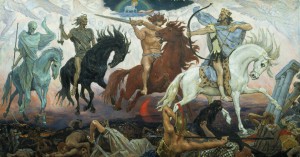By Cris Putnam
 I believe eschatology is not only an essential element of theology and preaching it is a necessary one. I argue its necessity in light of its unfortunate marginalization by a large percentage of the nominal church. Accordingly, I contend that the answer to the Gospel’s greatest challenge is eschatological. The ancient philosopher Epicurus asked, “if there is a benevolent and sovereign God, then why is there so much evil and suffering?” The Bible has a coherent answer to the problem of evil. Scripture presents a God who knows the end from the beginning and reveals future events (Is 46:9-10). It predicts that evil will not prevail in God’s economy (Is 11:6-9, 2:2-4; Re 21:4) and a day of reckoning is coming (Is 13:9; Ob 15 ff; 1 Th 5:2; 2 Pe 3:10; Re 16:16). Rather than understanding the term apocalypse as the “end of the world,” end time prophecy is the revelation of redemption.
I believe eschatology is not only an essential element of theology and preaching it is a necessary one. I argue its necessity in light of its unfortunate marginalization by a large percentage of the nominal church. Accordingly, I contend that the answer to the Gospel’s greatest challenge is eschatological. The ancient philosopher Epicurus asked, “if there is a benevolent and sovereign God, then why is there so much evil and suffering?” The Bible has a coherent answer to the problem of evil. Scripture presents a God who knows the end from the beginning and reveals future events (Is 46:9-10). It predicts that evil will not prevail in God’s economy (Is 11:6-9, 2:2-4; Re 21:4) and a day of reckoning is coming (Is 13:9; Ob 15 ff; 1 Th 5:2; 2 Pe 3:10; Re 16:16). Rather than understanding the term apocalypse as the “end of the world,” end time prophecy is the revelation of redemption.
The great hope and significance of existence is wrapped up in God’s eschatological plan. New Testament scholar Gordon Fee writes, “The theological framework of the entire New Testament is eschatological.”[1] The Greek word for the “end” is eschaton, meaning when God brings our present age to consummation. Jesus announced the kingdom was at hand at his first coming (Mt 3:2; Mk 1:15) but later qualified that it will not be fully realized until his second coming (Mk 14:25; Rev 20:4). The kingdom is inaugurated but not realized, a paradigm called the “already-not-yet” in New Testament theology. Bock and Blaising explain that this “links the plan of God into a unified whole.”[2] Based on this, one can see that eschatology is not a fringe element of Christian theology rather the fundamental structure by which it is understood. Since this is the case, why is it marginalized?
Timothy Jones warns of two contrasting errors: 1) a slip into unjustified speculation; 2) a slip into skeptical cynicism.[3] Given the inherent tension in the “already/ not yet” both are understandable. On one hand, we long for the resolution of evil and it is only natural look to for signs. On the other hand, the last two thousand years of anticipation compounded by the constant barrage of secularism promotes skepticism. Of course, either extreme results in error. In the first case, Harold Camping’s date setting resulted in the slaughter and arrest of hundreds of Hmong Christians.[4] On the opposite end, people leave the church because they have no hope. It seems like God wants every generation to expect the Lord’s return. John uses its promise as a call to holy living (1 Jn 2:28). Paul writes “Besides this you know the time, that the hour has come for you to wake from sleep. For salvation is nearer to us now than when we first believed.” (Ro 13:11) In fact, he encourages Titus, back in the first century, to wait for the “blessed hope” (Tit 2:13). For this hope to encourage, one must believe it can actualize.
[1] Fee, Gordon D. ; Stuart, Douglas K.: How to Read the Bible for All Its Worth. 3rd ed. Grand Rapids, MI : Zondervan Publishing House, 1993, S. 145.
[2] Craig A. Blaising and Darrell L. Bock, Progressive Dispensationalism, 98 (Grand Rapids, MI: Baker Books, 1993).
[3] Timothy Paul Jones, Rose Guide to End-Times Prophecy, Kindle Edition, (Torrence, CA: Rose Publishing, 2012), Kindle Locations 59-63.
[4] Nicola Menzie, “Harold Camping Linked to Huge ‘Massacre’ of 100’s of Hmong Christians” The Christian Post, http://www.christianpost.com/news/harold-camping-linked-to-hmong-christians-massacre-in-vietnam-52351/ (accessed 10/25/2012).



